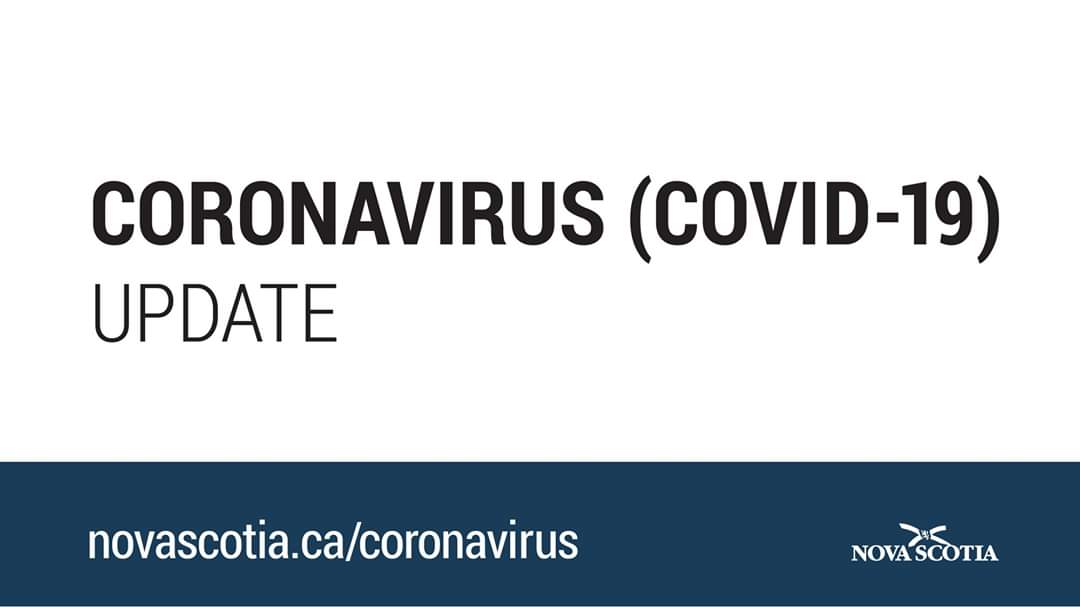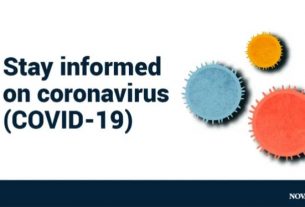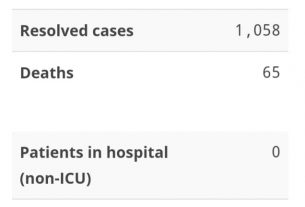**** HEALTH/WELLNESS Media Release
40 New Cases of COVID-19, 31 Recoveries
—————————————————————-
NOTE: Nova Scotia is not issuing COVID-19 news releases or updating the COVID-19 data dashboard on weekends. Monday updates will include weekend data.
—————————————————————-
Today, November 5, Nova Scotia is reporting 40 new cases of COVID-19 and 31 recoveries.
There are 21 cases in Central Zone, 11 cases in Western Zone and eight cases in Northern Zone. Nova Scotia Health Authority’s (NSHA’s) public health team is investigating these new cases to understand the circumstances around the increased numbers.
On November 4, two schools were notified of an exposure(s) at their school. As always, all staff, parents and guardians are notified of exposures if a positive case (student, teacher or staff) was at the school while infectious. A list of schools with exposures is available online: https://backtoschool.ednet.ns.ca/school-exposures
There have been 110 cases of COVID-19 with an episode date between October 28 and November 3. Of those:
— 34 (30.9 per cent) were fully vaccinated
— 7 (6.4 per cent) were partially vaccinated
— 69 (62.7 per cent) were unvaccinated
There have been 5,833 cases from March 15 to November 3. Of those:
— 406 (7.0 per cent) were fully vaccinated
— 371 (6.3 per cent) were partially vaccinated
— 5,056 (86.7 per cent) were unvaccinated
There were 308 people hospitalized. Of those:
— 14 (4.5 per cent) were fully vaccinated
— 31 (10.1 per cent) were partially vaccinated
— 263 (85.4 per cent) were unvaccinated
Thirty-five people died. Of those:
— 4 (11.4 per cent) were fully vaccinated
— 3 (8.6 per cent) were partially vaccinated
— 28 (80.0 per cent) were unvaccinated
As of today, Nova Scotia has 220 active cases of COVID-19. Of those, nine people are in hospital including one in ICU.
There were 28,608 rapid tests administered between October 29 and November 4. This includes 1,488 rapid tests at the pop-up sites in Halifax, Dartmouth, Amherst and Kentville and 27,120 through the workplace screening program. Another 8,661 home rapid tests were distributed at the pop-up sites.
On November 4, NSHA’s labs completed 3,204 tests.
As of November 4, 1,583,479 doses of COVID-19 vaccine have been administered. Of those, 767,200 Nova Scotians have received their second dose, and 4,586 eligible Nova Scotians have received a third dose.
Since August 1, there have been 1,654 positive COVID-19 cases and seven deaths. Cases range in age from under 10 to over 90. There are 1,427 resolved cases. Cumulative cases may change as data is updated in Panorama.
Testing advice:
Nova Scotians with or without symptoms can book a test at: https://covid-self-assessment.novascotia.ca/en for COVID-19 for COVID-19 testing centres across the province. Those eligible to receive asymptomatic testing are listed at: https://www.nshealth.ca/visit-covid-19-testing-site . Those with no symptoms who do not meet the criteria are encouraged to use one of the rapid testing pop-up sites if they want to be tested. Some public health mobile unit clinics also offer drop-in testing; this will be noted in promotions.
Anyone with COVID-19 symptoms is advised to self-isolate and book a COVID-19 test.
Anyone advised by public health that they were a close contact needs to complete a full 14-day quarantine, regardless of test results, unless they are fully vaccinated. If they are fully vaccinated at least 14 days before the exposure date, they do not need to self-isolate as long as they are not experiencing any COVID-19 symptoms. They should still get tested and should monitor for symptoms up to 14 days after the exposure date. If symptoms develop, they should get tested and self-isolate until they receive a negative test result.
Symptoms and self-assessment:
Nova Scotians should visit https://covid-self-assessment.novascotia.ca/ to do a self-assessment if in the past 48 hours they have had or are currently experiencing:
— cough (new or worsening)
Or two or more of the following symptoms:
— fever (chills, sweats)
— headache
— runny nose or nasal congestion
— sore throat
— shortness of breath or difficulty breathing
People should call 811 if they cannot access the online self-assessment or wish to speak with a nurse about their symptoms.
Anyone with symptoms should immediately self-isolate and book a test.
Quick Facts:
— a state of emergency was declared under the Emergency Management Act on March 22, 2020, and has been extended to November 14, 2021
Additional Resources:
Nova Scotians can find accurate, up-to-date information, handwashing posters and fact sheets at: https://novascotia.ca/coronavirus
More information on COVID-19 case data, testing and vaccines is available at: https://novascotia.ca/coronavirus/data/
More information about public health text notifications of positive COVID-19 cases and close contacts is available here: https://www.nshealth.ca/news/public-health-begins-contacting-positive-covid-19-cases-close-contacts-text-message
Government of Canada: https://canada.ca/coronavirus or 1-833-784-4397 (toll-free)
.
Update on Vaccination Mandate for Healthcare, Education, Other Sectors
—————————————————————-
The Province is releasing initial data on the vaccination rates of workers in healthcare, long-term care, education and emergency health services today, November 5.
Employers are required to collect and report vaccination rates as part of the COVID-19 vaccine mandate announced September 29.
Under the mandate, all employees are required to have at least a first dose of vaccine by November 30, with a requirement to show proof of full vaccination 70 days after their first dose. Those who are partially vaccinated may be subjected to other health and safety measures, including testing. Those who do not have a first dose by November 30 will be placed on unpaid administrative leave.
As of November 4, between 50 and 90 per cent of employees in key sectors have provided proof of vaccination. Of those who responded, most are fully vaccinated:
— Nova Scotia Health Authority: 91 per cent
— IWK Health Centre: 99 per cent
— Long-term care: 93 per cent
— Home care: 89 per cent
— Education: 97 per cent
— Emergency Health Services: 99 per cent
“I’m encouraged by the rates so far and I want to thank all of the employees who are vaccinated and doing their part to keep the vulnerable people they work with safe from COVID-19,” said Premier Tim Houston. “This mandate is serious, but these are serious times and we have to take our responsibility to protect others seriously. If you haven’t been vaccinated yet, I encourage you to make the right choice.”
Data collection continues. Over the next couple of weeks, employers will be following up with employees who have not yet reported their status or their intention to be vaccinated.
Employees who have not yet reported, or who have said they do not intend to be vaccinated, must complete a mandatory educational program.
The COVID-19 vaccine mandate covers more than 80,000 employees. The following groups are included:
— Nova Scotia Health Authority and IWK Health Centre
— workers in long-term care facilities (licensed and unlicensed) and home-care agencies (publicly and privately funded)
— public school teachers, pre-primary and other school-based staff, regional and board office staff, and those providing services in schools, including cafeteria and school bus services
— early childhood educators and staff in regulated child care, as well as any volunteers, practicum students, or other professionals entering these settings
— Hearing and Speech Nova Scotia
— workers in residential facilities and day programs funded by the Department of Community Services Disability Support Program and adult day programs funded by Department of Seniors and Long-Term Care
— workers in Department of Community Services facilities and those providing placements for children and youth in the care of the Minister of Community Services (excluding foster family placements)
— paramedics, LifeFlight nurses and some other staff at EHS
— physicians and other service providers to the above organizations; for example hairdressers and contractors
— correctional officers, youth workers, volunteers, visitors, contractors and service providers who work in, or provide service to adult or youth correctional facilities.
Quick Facts:
— about 79 per cent of Nova Scotians are fully vaccinated
Additional Resources:
Information on COVID-19 vaccination and how to get vaccinated: https://novascotia.ca/coronavirus/vaccine/
Previous news release: https://novascotia.ca/news/release/?id=20210929007
.
Province Adopts National Recommendations on COVID-19 Vaccine Boosters
—————————————————–
Nova Scotia will begin to administer COVID-19 booster doses to more eligible groups by the end of November.
The Province will accept all five recommendations announced on October 29 by the National Advisory Committee on Immunization (NACI). This includes offering boosters to people with a higher risk of serious COVID-19 illness or decreased protection since vaccination.
“As we prepare to offer booster doses, our first priority will continue to be encouraging people who have one or no doses of COVID vaccine to get vaccinated,” said Dr. Robert Strang, Nova Scotia’s Chief Medical Officer of Health. “Boosters may provide an added level of protection, but the best way to reduce the spread of the virus is to ensure that everyone has at least two doses of vaccine.”
NACI recommended that booster doses be offered at least six months after the primary series is completed. Groups who will be eligible for a booster dose in Nova Scotia include:
— anyone 80 and older, followed by anyone ages 70 to 79
— adult frontline healthcare workers who were double vaccinated with an interval of less than 28 days between their first and second doses
— people who received two doses of the AstraZeneca Vaxzevria/COVISHIELD vaccine or one dose of Janssen vaccine
The Province is also engaging with Indigenous and African Nova Scotian communities on the best way to offer booster doses in those communities.
Planning for the booster doses is underway, and updates to the vaccine booking system are being made. More information will be announced once booking for booster doses opens.
NACI also recommended last month that the optimal interval between first and second doses is eight weeks. Nova Scotians can still schedule their second dose as early as 28 days after the first but are encouraged to follow the NACI recommendation and wait eight weeks for their second dose.
Quick Facts:
— booster doses for people living in long-term care and other congregate settings that provide care for seniors became available October 25
— third doses for moderately to severely immunocompromised people or people who are taking medications that substantially suppress their immune system became available October 4
— people who are required to travel for work to a country that does not recognize a mixed vaccine series may be eligible for a third dose to meet entry requirements or to avoid isolation
Additional Resources:
Nova Scotia’s COVID-19 Vaccine Plan: https://novascotia.ca/vaccineplan
NACI’s October 29 interim guidance on COVID-19 booster doses: https://www.canada.ca/content/dam/phac-aspc/documents/services/immunization/national-advisory-committee-on-immunization-naci/recommendations-use-covid-19-vaccines/statement-guidance-booster-doses/summary/summary.pdf




